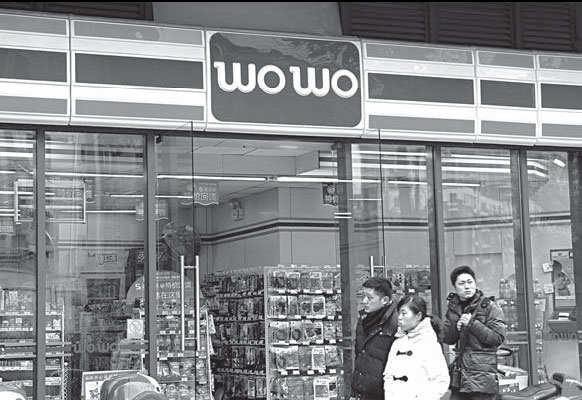|

On a visit to Chengdu, a Thai commerce official said he found the signs on Wowo convenience stores use 'the same design and arrangement of colors' as his nation's flag. Provided to China Daily
|
Tang Yaohua, founder and chairman of Chengdu-headquartered convenience store chain Wowo Inc, says he was shocked to get a notice in 2012 banning two of his company's trademarks even though they have been in use for years.
The revocation by the national trademark office said the marks too closely resemble the national flag of Thailand.
In response, Wowo filed a lawsuit in Beijing on March 10 asking the office to lift the ban.
It is the first case in China for a foreign government to raise an objection against a domestic retailer over a trademark, said Han Yingmei, an attorney for Wowo and a partner of Tahota Law Firm.
The issue began early last year when the Chengdu trademark office received a complaint from a commerce official at the Thai embassy who had been in the city and saw a Wowo shop sign "that used the same design and arrangement of colors as the Thai national flag".
The Thai Ministry of Commerce then requested that Wowo stop using the logo to avoid "consumer misunderstanding that the store is associated with Thailand or sells Thai products".
Following the request, the Trademark Office at the State Administration for Industry and Commerce revoked the trademarks last year.
But Tang said the similarity is just a coincidence and he has "no motivation to use a foreign national flag as a trademark".
"When I was designing the logo, I did not even know what the Thai national flag looked like," he told the Sichuan Daily newspaper.
He said that the two designs are actually different, and it is easy to tell the difference - the Wowo logo uses orange, white and light blue stripes. The Thai national flag has bold red, white and blue colors.
Tang appealed the administration's decision, but the Trademark Appeal Board rejected one of the appeals at the end of last year. The other is still under review.
Wowo applied for the now-disputed trademarks in 2005 and they were granted in 2009. In 2011 the city granted them status as Chengdu famous trademarks.
With more than 300 shops across the city, Wowo is the only home-developed company that can compete with foreign-funded convenience stores in Chengdu, said the chairman. The brand is valued at around 300 million yuan ($48.3 million).
"If we lose the lawsuit and the trademarks are banned after all, it will cost us more than 10 million yuan just to change the signs on the shops," he said. "It would be a fatal impact on a low-margin business like ours."
"Although the Thai government has the right to raise the objection, there is no clear standard in Chinese law to measure the similarity," said Attorney Han.
Xuan Zhiyu, secretary-general of the Shanghai Chamber of Commerce in Sichuan, said that whether the two are similar is subjective.
"I don't think of the Thai national flag when I see the Wowo logo, and I have never heard anyone say they look like each other," Xuan said.
zhangzhao@chinadaily.com.cn
(China Daily 03/20/2013 page17)

